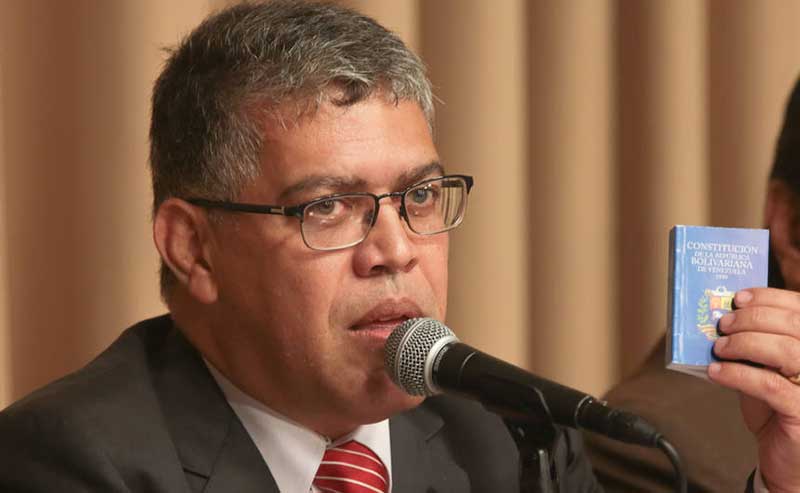
By Elías Jaua Milano
Regarding the recent social outbursts in Ecuador and Chile, in the first case against the attempt to impose a neoliberal package and in the second as a result of the structural exclusion that has caused the systematic and continued implementation of these neoliberal policies throughout four decades, the dominant elites, the media and even many academics wonder: “How did it happen? If the day before nothing indicated that a popular explosion could happen.” “How did we not realize?”, politicians said looking for excuses.
In this regard, I consider that social rebellions are not surprising, they are absolutely foreseeable, under the principle of such actions, such consequences, and also, the people do warn.
The application of models of political, economic, social and cultural exclusion; the deep social inequality gaps; the impunity in the exercise of power and in the enjoyment of wealth, the majority of which is illegal, by political and business elites; social control through alienation, patronage and police repression and impunity for those who have power are the main ingredients for a social hotbed.
RELATED CONTENT: Strike at the Helm at Seven: Lessons and Challenges for Venezuela
Those who sow winds, reap storms, the words of the wise and free people say.
The people send warning signs, send signals that nobody hears, sees, or they simply ignore.
Let’s see some of those alerts that people send to the leadership bubbles, over the years, sometimes decades:
- Increasing electoral abstention in the processes of popular consultation for the election of the authorities, which expresses that the bulk of the population has stopped legitimizing the political system. They do not feel expressed or represented by anyone.
Disenrollment in public, political and social organizations. Parties, guilds, unions, social organizations, of any ideological sign, empty of people, until they become empty shells or occupied by a small group of the “irreducible” who assume, mistakenly, that they represent the majority.
Apparent passivity, people stop protesting to sue the authorities not because they are happy, but because they know they will not get any response or solution from them. The calvary goes inside.
Social anomie expressed through the illegal resolution of problems; recurring episodes of social violence, small, in different parts, at different times; increased crime, loss of mediation of political and social leaderships and the state-society relationship is reduced to a repressive dialogue with the police.
- The popular comment on the streets, in family gatherings, in recreational, sports activities, among others, made in the third person: “Sooner rather than later, something is going to happen here, people will get tired.” The people always know what they are going to do and they announce it.
As the martyr President Salvador Allende well said, in his last address, that fateful September 11, 1973, in Chile: “Social processes do not stop …” The rebellion of peoples against exclusion and in the search for a model where they can live well, with justice, with equality with dignity can be delayed, contained but in the end, if there are no deep and sincere rectifications in the ethical, political, economic, social and cultural plane, these will manifest themselves exercising the supreme human right to rebellion.
General Ezequiel Zamora said: “You have to listen to the people, always listen to the people”; We were reminded of Commander Chávez, in the speech of December 8, 2012: “Listening to the people, always listening to the people.” Let’s always listen, rectify on time and move forward with our people in the recovery and consolidation of a humanly rewarding way of life.
Translated by JRE/EF

Elias Jaua Milano
Elías José Jaua Milano is a Venezuelan politician and former university professor who served as Vice President of Venezuela from January 2010 to October 2012.He was Minister of Foreign Affairs since January 2013. Jaua obtained a Sociology degree from the Central University of Venezuela. In 2000 he was part of the Comisión Legislativa Nacional and Minister of the Secretaría de la Presidencia from 2000 to 2001.
He was nominated as Venezuelan Ambassador to Argentina in 2002. Jaua served as Minister of Agriculture in President Hugo Chávez's government before being appointed as Vice-President in January 2010, while remaining Minister of Agriculture. On 15 December 2011, following a major reshuffle of the Venezuelan political leadership, President Chávez proposed Jaua to be the PSUV candidate for governor of the state of Miranda (reported in El Universal).
He resigned the vice presidency on 13 October 2012 to compete in the election and was replaced by Nicolás Maduro. He lost the election on 16 December 2012 to the former governor Henrique Capriles who had stepped down in June 2012 to unsuccessfully challenge Hugo Chávez for President. Jaua succeeded Nicolás Maduro as Minister of Foreign Affairs on 15 January 2013.
Share this:
- Click to share on Twitter (Opens in new window)
- Click to share on Facebook (Opens in new window)
- Click to share on LinkedIn (Opens in new window)
- Click to share on WhatsApp (Opens in new window)
- Click to share on Reddit (Opens in new window)
- Click to share on Telegram (Opens in new window)
- Click to email a link to a friend (Opens in new window)




